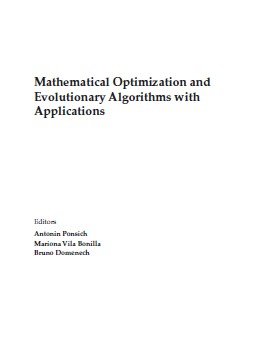
Free Download Mathematical Optimization and Evolutionary Algorithms with Applications by Antonin Ponsich, Mariona Vila Bonilla, Bruno Domenech
English | PDF | 2023 | 386 Pages | ISBN : N/A | 52.1 MB
It is recognized that many real-world problems can be interpreted and formulated as optimization problems. This feature has fostered the development of research studies aiming to design and implement efficient optimization methods, able to address the increasing complexity of the applications that are intended to be solved. These research studies have mostly followed two main axes.
The first one focuses on the theoretical development of advanced solution strategies through the perspective of tackling problems of increasing complexity. For instance, multimodal objective functions, highly constrained search spaces, single vs. multi-objective problems, optimization of stochastic systems, among others. In this matter, thanks to both cutting-edge mathematical tools and the increasing power of computational hardware, exact solution methods (in general based on mathematical programming) now enable solving large-size intricate problems. However, many problems have also required the implementation of approximated, heuristic or metaheuristic techniques, which are not affected by the mathematical properties of the tackled problem but, on the other hand, are unable to guarantee result optimality. Within this class of approximated optimization methods, evolutionary algorithms occupy a relevant part of the devoted literature.
On the other hand, a great effort has also been made towards developing problemdevoted techniques that aim to efficiently find high-quality solutions to specific applications drawn from a wide spectrum of areas (engineering, social sciences, biotechnologies, finances, etc.). The corresponding studies do not usually start designing a new solution strategy from scratch, but rather reuse techniques developed in general frameworks and adapt their working mode to the specific feature of the problem that is being tackled. As a consequence, it is necessary to take advantage of the problem structure, conditioning factors or particular characteristics of the considered application for an efficient solution technique to be built.
The Special Issue proposed here illustrates both types of studies. Indeed, as shown in Table 1, 5 out of the 16 published articles tackle the issue of the theoretical development of optimization techniques or the formulation of academic operations research problems. Among these theoretical papers, two of them propose novel mathematical formulations for academic problems, while the other three focus on the development of evolutionary algorithms as a solution technique. The remaining 11 papers propose original and ad hoc solution strategies for different applications. Table 1 provides an overview of the topics addressed in these papers. It is worth highlighting that among these 11 studies, a majority of them use evolutionary algorithms, while four are based on mathematical programming.
[/b]
Mathematical Optimization and Evolutionary Algorithms with Applications Torrent Download , Mathematical Optimization and Evolutionary Algorithms with Applications Watch Free Link , Mathematical Optimization and Evolutionary Algorithms with Applications Read Free Online , Mathematical Optimization and Evolutionary Algorithms with Applications Download Online
